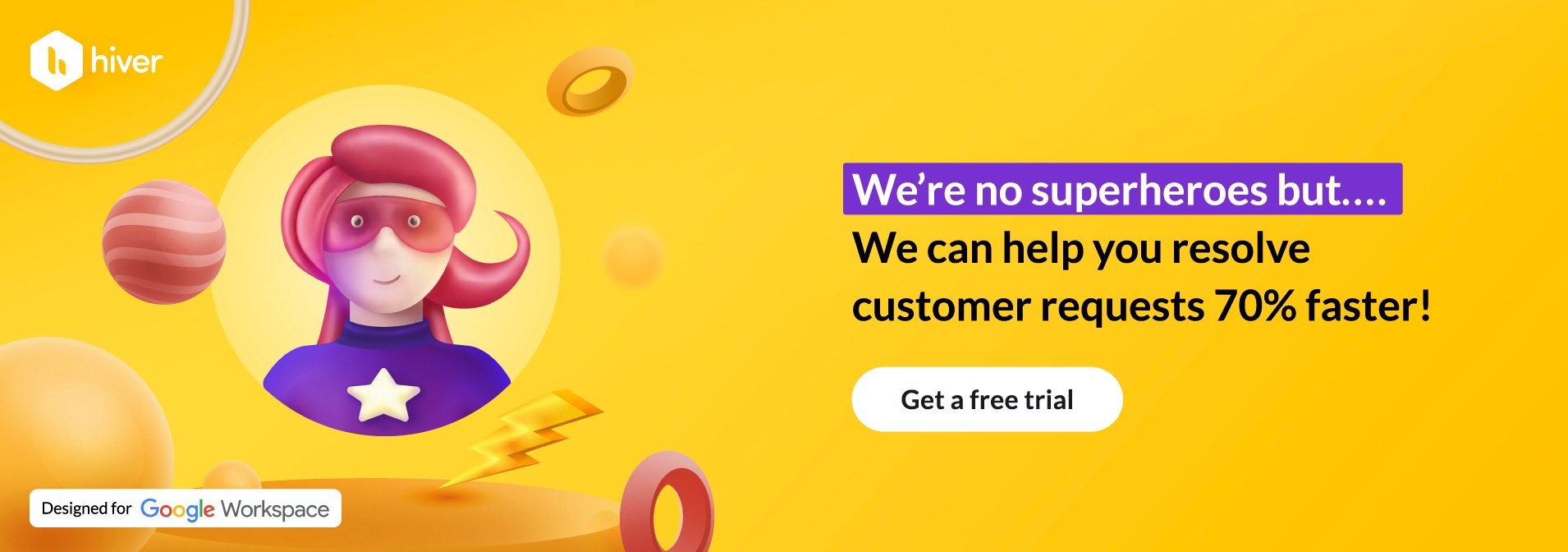When I think of writing notes, I can only think of the classic 90s TV/movie trope: passing notes in class, the teacher intercepting the not-so-private note, and the subsequent hilarious, often embarrassing consequences.
But that trope, in effect, captures the purpose of a written internal note — conveying behind-the-scenes information, the back and forth collaboration that goes into an idea before that idea is opened up to everyone.
And if you were like me, and you’ve had your not-so-private note intercepted and confiscated and read out loud in the classroom, then you’ve experienced the embarrassment firsthand. The same thing can happen in a customer support scenario as well. If you receive a complex customer query, the chances are that you’ll need to rope in someone from your team; there will be a bit of a back and forth between you and your various teammates until the issue is finally resolved.
If you’re using email for customer support, you’ll perhaps forward this customer query email to a colleague. Your colleague replies to you, but you realize that the customer has been accidentally CC’d on this email. As the horror of what has happened starts to sink in, you realize that you need to do some damage control.
CCing and Forwarding emails is great for private communication, but it is quite easy to mess up when more stakeholders are involved. And this can cost you in terms of client loyalty and, more importantly, reputation.
Sharing private communication between team members over email can be difficult, and that’s why Hiver (and most customer support software) come with the provision to write internal notes.
Email Notes help you write private messages and collaborate with your team behind the scenes without the fear of any team communication ever accidentally reaching the customers.

Before we dive deep into writing better internal notes, let’s look at some benefits of writing internal notes for support.
Table of Contents
- Benefits of good internal notes for support
- How to write a good internal note for customer support
- Smaller but significant things
- Wrapping up
Benefits of good internal notes for support
Internal notes or email notes are typically used for private conversations between team members, where the information that is being conveyed is not relevant to the customers. Notes usually include additional information about a customer’s use case or special instructions for your colleagues that they need to follow while speaking to a particular customer.
Some of the benefits of writing notes for support include:
Deliver faster customer service
Well-written internal notes can help summarize support conversations, making it easier to resolve them faster.
Provide consistent responses
When multiple support agents handle the same customers’ support requests, well-written notes will ensure that the customer receives the same, consistent quality of service, no matter who is working on it.
Prevent bottlenecks
Customer support is a stressful job, and we get that. Sometimes support agents may neglect conversations when it isn’t clear on how to respond to them. Good notes help support agents understand how to approach a conversation, thus preventing them from piling up at the bottom of the queue and creating bottlenecks.
Cross-team collaboration
Sometimes, when you handle complex customer queries, you might need other teams to resolve the problem. In such situations, notes can help in building context, thus saving time and facilitating easier collaboration.
Avoiding inbox clutter
Because internal notes do not involve emails, they do not end up cluttering your inbox. They save you from hours of clunky Forwards, CCs, and needlessly meandering email threads, which end up clogging up your inbox and prevent you from solving customer issues faster.
Customer support training material
Well-written internal notes can provide a wealth of information for training a support team. They can be great for helping new team members understand how to navigate through different support scenarios.
How to write a good internal note for customer support
While most rules of providing effective customer communication universally apply to internal notes, a few can be rather specific. Let’s take a look:
1. Always include all case-specific knowledge
Experienced support team members usually have a lot of knowledge on dealing with specific support issues. If you’re an experienced support team member, make sure to put down all of that information in notes, especially when you find unique problems. These notes can be passed on to other team members for learning.
2. Always provide clear instructions
Customer support is a highly process-oriented role. Ensure that your support note has detailed information about the processes that need to be followed and the next steps that need to be taken. This will help in a seamless hand-off when another team member needs to take over.
3. Assign responsibility
When you need an action to be taken, ensure you clearly assign the note to the team member responsible for it. This ensures clarity, accountability, and faster resolution.
4. Provide necessary context
An all-too-common example of terrible customer service is contacting customer support and being forced to start from the beginning — revisiting a previous conversation. This increases the time taken to resolve the issue, the number of interactions needed for resolution, and most importantly, it increases the effort that a customer needs to put in to resolve the issue. Include all possible context in internal notes to ensure that your teammates don’t need the customers to repeat themselves and put in unnecessary effort.
5. Write for the intended audience
This is especially important when you are collaborating with members of teams from across the organization. Do not use jargon or short forms that they may not understand. This will only complicate things and increase the scope for error.
Writing notes for cross-team collaboration will also require you to use your personal judgment when it comes to providing context and figuring out the level of detail you will have to go into. For instance, you may not need to give members of the support team as much detail because they are familiar with support processes, but you may have to provide a lot more detail if you escalate a customer’s issue to your engineering team.
6. Include important dates and times
If the customer is on a tight deadline, or if you have promised a customer that the issue will be resolved within a particular time, ensure that you include that information in the note. This will help your team stay aware of the deadline.
7. Keep them short, simple, and relevant
Discussions between team members can often become long and complex. If the discussion happening in the notes section of your helpdesk is going a little out of hand, it is best to move it away from the helpdesk and move it to a collaborative platform like Slack. Ensure that the discussion happening in the internal notes is extremely relevant and easy to understand for your organization’s employees.
Smaller but significant things
Use ‘@mentions’ to assign and notify teammates
Hiver’s ‘@mention’ feature is the fastest way to bring a note to the attention of the right person. When you ‘@mention’ someone in a note, they receive an instant notification from Hiver letting them know that they need to look into an issue.

And if you want to direct the entire team’s attention to a particular issue, simply add an ‘@all’ to the note.
Put a pin on it

Pinned Notes in Hiver allow you to keep the most important notes in a conversation at the top of their timeline. This way, the most important parts of the conversation will not get lost in the noise, keeping them easily accessible and referenceable.
Wrapping up
We’ve shown time and again how email is an essential part of customer communication and that it is here to stay. But for email to become an effective team collaboration tool, it needs to get that little extra push.
And that’s where a tool like Hiver comes in. Hiver, with its Email Notes capabilities, can go a long way in helping your team collaborate better using email and make email work better for your business.

 Skip to content
Skip to content












